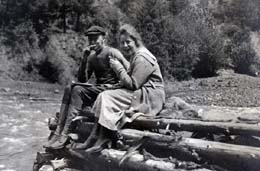Frances Owen served on the Seattle School Board, and on the boards of the Children's Orthopedic Hospital, the Ryther Child Center, and the National Child Welfare League. She chaired the women's division of the Community Chest campaign, and served as a member of the United Good Neighbor planning committee. She was a member of the board of regents of Washington State University and was active in the Association of Governing Boards of Universities and Colleges (for which she served as president). Mrs. Owen also served as a member on the Advisory Committee on Higher Education. She was known throughout her public career by her married name, Mrs. Henry B. Owen, until her husband died in 1976. She then became Frances Penrose Owen. The Seattle-King County Association of Realtors named her First Citizen of 1967.
Child of Whitman College
Frances Penrose was born in 1900, the daughter of Stephen B. L. Penrose (1864-1947) and Mary Shipman Penrose. She grew up in Walla Walla, where her father was president of Whitman College, and described herself as a fat, freckled, red-haired tomboy. While a student at Whitman, she became friends and hiking partner with another Whitman student, William O. Douglas (1898-1980), later a justice of the U.S. Supreme Court.
Owen graduated from Whitman at the age of 19 with a degree in Greek, then studied politics at Bryn Mawr College in Pennsylvania. She returned to Whitman to teach economics. Her father encouraged her to attend the Prince School in Boston, which taught personnel and merchandising work, some of the few fields open to educated women at the time. In Boston she earned a master's degree in education from Harvard and a certificate from Prince. She moved to Seattle to run the personnel training department at the Frederick & Nelson Department Store. She eventually married her boss, Henry B. Owen.
Children's Hospital
Marriage meant that Owen would leave the professional world, as was then customary, to contribute her business skills to charity. She joined the board of the Children's Orthopedic Hospital in 1934.
She also considered joining the board of another charity, Visiting Nurses. "I, who had been a working girl at that time and didn’t know anything of the social structure of the city, said to this much older friend of mine, ‘What should I do? Should I do them both?’ which I should have done in later years, but she said, ‘Oh no, take the Children’s Orthopedic Hospital. That is THE most desirable assignment of any of the boards in Seattle.’ I would say for ten or fifteen years, the Children’s Orthopedic Hospital was the favorite charity of Seattle. Everybody knew, everybody admitted it" (Binnion interview).
Skills Put to Educational Use
Owen’s work at the Orthopedic gave her more practice at management and committee work, particularly during World War II when the hospital struggled with severe labor shortages and increased demands for pediatric services. In 1945, she ran for a seat on the Seattle School Board and won, the first woman on the board since Anna Louise Strong was recalled in 1919 for her pacifist views. Owen served on the school board for 22 years and became an advocate for children and education.
In 1957, Owen was appointed as the first woman to hold a seat on the Board of Regents for Washington State College (later Washington State University). She served WSU for 18 years and the science and engineering library there is named for her. WSU President Emeritus Glenn Terrell said, "Frances is a rare combination of strength, gentleness, intelligence and forcefulness."
Accolades
In 1966, the Municipal League of King County named her Outstanding Citizen of the Year. In 1967, the Seattle-King County Association of Realtors named her First Citizen of the Year. In 1990 Governor Booth Gardiner awarded her the state’s Medal of Merit for her service to education.
Frances Owen died in 2002 at the age of 102.

